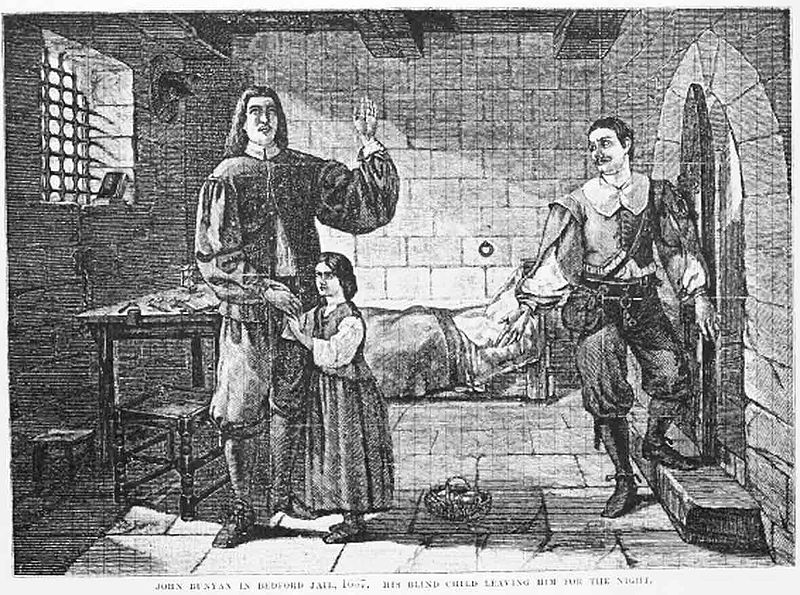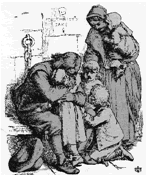“But Peter and the apostles answered, ‘We must obey God rather than men.'” (Acts 5:29)
Everyone is familiar with the famous author of Pilgrim’s Progress, John Bunyan. He was married twice; both wives were very godly women. When he met his first wife, Mary, he was a very irreligious man. Though she was advised about becoming unequally yoked, she married him in the hopes that he would be saved. She gave him several good books to read, and she reminded him of the devout life that her father had always led. He thought on these things and became softer toward the things of God, but it took many years before he was genuinely converted. By the grace of God, he wholeheartedly accepted Christ and was soon called to preach at the Baptist Church of Bedford. He enjoyed a ministry with the people in the surrounding communities, where hundreds would come to hear him. It is not quite certain when Mary died. She left John with four children – two daughters, Mary, who was blind, and Sarah; and two sons, Thomas and Joseph. Her death probably occurred sometime after 1656.
Several years after this, around 1659, John met and married Elizabeth. She was only 17 or 18 years old. He was 31 and a father with four children. Though young, she was known for her piety. God had prepared her for the affliction that was soon upon her. They had only been married a short while when he was thrown into prison. When Charles II was restored to the throne in 1660, no one was allowed to preach without his permission. John Bunyan refused to get the license, believing that it was his responsibility and right and privilege to preach. The officials had thrown him into prison illegally, claiming that he was disturbing the peace. Those were false charges. He had only to sign a paper agreeing with them and he could have been released in three months, but he refused.
prison. When Charles II was restored to the throne in 1660, no one was allowed to preach without his permission. John Bunyan refused to get the license, believing that it was his responsibility and right and privilege to preach. The officials had thrown him into prison illegally, claiming that he was disturbing the peace. Those were false charges. He had only to sign a paper agreeing with them and he could have been released in three months, but he refused.
Elizabeth bravely went before the judges of Bedford to plead her husband’s case in 1661. She also presented a petition to the Earl of Bedford requesting his release. The petition was denied.
She then took her petition before two judges who sat in the Swan Inn in Bedford in the Swan Chamber. There were many other local people and officials present. They had come to watch Elizabeth as she confronted the judges with the justice of her husband’s case. She had a courageous exchange with them, all by herself. But she did not prevail. Bunyan would stay in prison for twelve years. During this time, he and Elizabeth would have to face the sorrow of losing a child. Elizabeth had conceived before John went to prison. The stress and strain of dealing with the court officials caused her to miscarry.
Elizabeth encouraged John to minister right where he was. She was allowed to visit him and bring the children. He preached the whole time he was in prison, and of course we all know that he did much writing as well. He was very grateful for Elizabeth. “The parting with my wife and poor children hath often been to me in  this place as the pulling the flesh from the bones. . . .I should have often brought to my mind the many hardships, miseries, and wants that my poor family was like to meet with should I be taken from them. . .But yet, recalling myself, thought I, I must venture you all with God, though it goeth to the quick to leave you.” What would have happened to his children if Elizabeth had not been there? Would he have signed the license agreement so that he could stay home and care for them? If he had not had twelve years in prison, would we not have one of the most popular books ever written? Imprisonment was a sorrow, but John and Elizabeth trusted God. They knew that they had to remain faithful because He had a purpose for all things.
this place as the pulling the flesh from the bones. . . .I should have often brought to my mind the many hardships, miseries, and wants that my poor family was like to meet with should I be taken from them. . .But yet, recalling myself, thought I, I must venture you all with God, though it goeth to the quick to leave you.” What would have happened to his children if Elizabeth had not been there? Would he have signed the license agreement so that he could stay home and care for them? If he had not had twelve years in prison, would we not have one of the most popular books ever written? Imprisonment was a sorrow, but John and Elizabeth trusted God. They knew that they had to remain faithful because He had a purpose for all things.
John was released from prison in 1672 but rearrested in 1676. Eventually he was released again. In 1688, while on a journey to help a friend, he got very ill and died due to complications of exposure to the cold weather.
Elizabeth did honor to his memory by finding people to publish his works. The whole world would be grateful for this.
She only survived her husband for four years. We do not know much about her last years. We do know however, that John had made a will and signed over all of his property to her during his last imprisonment. This showed his confidence in her to take care of his children if he should perish in prison.
Elizabeth proved her loyalty and her love for her husband by standing behind him in all that he did – all of the trials, imprisonments, poverty, sorrows, and deprivations. She showed her courage by going into a man’s world of courts and justice systems. She was criticized because she was a woman, but her love for her husband and for the preaching of the word of God emboldened her to face the authorities, even as the apostles did in the early church. She is truly one of the shining lights of the Reformation.

